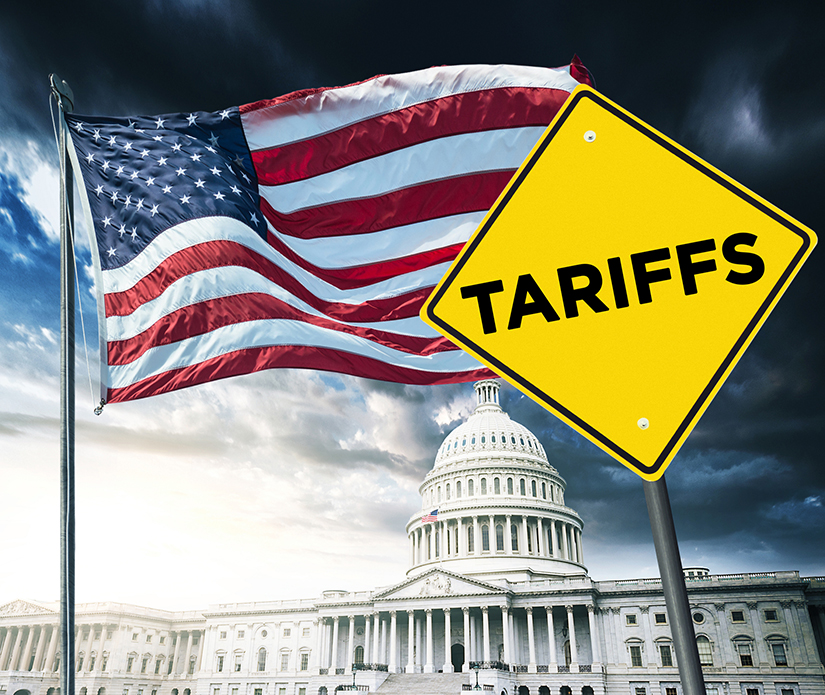On May 27, 2025, the leaders of ASEAN (Association of Southeast Asian Nations), GCC (Gulf Cooperation Council), and China gathered for the first time in Kuala Lumpur, the capital of Malaysia, for a summit. The meeting provided an opportunity to discuss trade, investment, and economic cooperation, as well as common efforts to combat terrorism and other transnational crimes, and to explore a new framework for cooperation between East Asia and the Middle East. This brief review examines the significance of the meeting, focusing on the aims of ASEAN and, in particular, its chair, Malaysia.

Trump Tariffs and ASEAN
In April 2025, U.S. President Trump announced the tariff rates he would impose on countries. He also imposed high tariffs across the board on ASEAN countries, with the highest rates at 49% on Cambodia and the lowest at 10% on Singapore.
Table: Tariff rates on ASEAN countries announced by President Trump in April 2025
| Country name | Tariff rate |
|---|---|
| Cambodia | 49% |
| Laos | 48% |
| Vietnam | 46% |
| Myanmar | 44% |
| Thailand | 36% |
| Indonesia | 32% |
| Brunei | 24% |
| Malaysia | 24% |
| Philippines | 17% |
| Singapore | 10% |
Source: Prepared by the author based on Amir Yusof, “Why are Trump’s tariffs in Southeast Asia highest among Indochina countries?” Channel News Asia, April 3, 2025を参考に筆者作成。
Countries quickly embarked on bilateral negotiations with the U.S., but negotiations have been difficult. Vietnam, with a 46% tariff rate, was confronted with a lengthy "list of demands" from the U.S. side, which reportedly included a reduction in imports from China[1]. Vietnam's trade is built on importing intermediate goods from China, completing them, and exporting them to the U.S., and Vietnam's economy has grown on the back of this trade cycle. Vietnam cannot, on its own, reorganize this sort of supply chain, and the country faces an unprecedented challenge in its relations with the U.S.
Most ASEAN countries are continuing serious negotiations with the U.S., but one country is not hiding its opposition. That country is Malaysia. Malaysia's relations with the U.S. have been stagnating since the Biden administration to begin with, and one of the main reasons for this is the Gaza issue. The Malaysian people, the majority of whom are Muslim Malays, are increasingly opposed to U.S. support for Israel, and Prime Minister Anwar Ibrahim, responding to the views of the public, has also criticized the U.S. policy. Malaysia has strongly opposed the idea of Palestinian resettlement as put forward by President Trump[2]. Malaysia has moved closer to China and formally applied to join BRICS in July 2024[3].
When President Xi Jinping visited Malaysia in April 2025, Prime Minister Anwar's speech at the welcome dinner included strong criticism of the U.S. and President Trump, although he did not name them explicitly. Prime Minister Anwar stated, “today, at a time when multilateralism is under tremendous strain... some nations abandon the principle of shared responsibility and others question long-standing commitments.” He went on to say, “in some quarters, the rules-based order has been turned on its head — dialogue has yielded to demands, tariffs are imposed without restraint, and the language of cooperation is drowned beneath the noise of threats and coercion.” At the same time as Anwar criticized President Trump’s tariff policy, he praised China as a protector of the system of free trade, saying, “China’s global initiatives offer a new lease on hope. They look outward, not inward. They speak not of rivalry, but of renewal,” going on to say, “in these trying times, the world yearns for steadiness, reliability and purpose. We see this in China’s conduct”[4].

ASEAN and the Malaysian Chairmanship: Aiming for "Collective Bargaining" with the U.S.
In 2025, Malaysia held the ASEAN chairmanship, and in the face of Trump tariffs, as chairman, attempted to lead ASEAN in forming a "united front" against the U.S. During the ASEAN Foreign Ministers' Meeting on May 25, 2025, Malaysian Foreign Minister Mohamad Hasan said that ASEAN must promote regional economic integration, diversify its markets, and maintain unity in response to the international trade disruption caused by the U.S. tariff policy, and Malaysia, as chairman, has offered to apply for "collective bargaining agreement" with the U.S. on ASEAN’s behalf[5].
At the subsequent ASEAN Summit, tariffs ultimately became one of the main items on the agenda. In the Chairman's Statement following the meeting, Malaysia expressed its concerns on behalf of ASEAN, saying, “amidst rising global trade tensions, we express deep concern over the recent announcement by the United States to impose unilateral tariffs and their potential impact on our economies.” On the other hand Malaysia made clear that it would, as a basic principle, pursue a breakthrough based on productive dialogue with the U.S., stating, “we will continue to engage in a frank and constructive dialogue with the U.S., and commit not to impose any retaliatory measures in response to U.S. tariffs,” going on to state, “we (remain) committed to ASEAN as a reliable economic partner and will work to foster a strengthened economic cooperation framework with the U.S., particularly in high-value and future-oriented sectors”[6]. These discourses showed the difference in attitude between Malaysia, the chairing country, which is trying to take a strong stance toward the U.S., and other countries that are concerned that criticism of the U.S. will have a negative impact on bilateral negotiations.
ASEAN-GCC-China Summit
Meanwhile, the ASEAN Summit Chairman's Statement also stated, "we will also strengthen and expand our economic links with ASEAN’s external partners, including our Dialogue Partners, and to seek out opportunities for cooperation with new partners.” For ASEAN, the summit with the GCC and China was meant to develop new economic partners that are not too dependent on exports to the United States.
At the ASEAN-GCC-China Summit, participating heads of state and government affirmed their respect for basic principles based on the UN Charter and international law, and their commitment to strengthening cooperation to promote peace, security, stability, and prosperity. ASEAN centrality, the GCC's security role, and China's international influence were each recognized, and the principles of good neighborly relations, respect for sovereignty, non-interference in internal affairs, and peaceful resolutions to differences were emphasized[7].
The importance of economic development and cooperation in the Asia-Pacific and Middle East regions were also recognized, with the three parties affirming that, as complementary economic blocs, they have great potential for increased trade, investment, and economic cooperation. The statement also reaffirmed a determination to strengthen confidence in the rules-based multilateral trade regime, centered on the WTO, to enhance sustainable development and economic resilience, and to make economic globalization more open, inclusive, and balanced[8].
While the need for cooperation in combating international crime, cybercrime, and terrorism, and in preventing extremism was shared, the joint statement included a special section on the situation in the Middle East, which was discussed in detail. There, the statement condemned the attacks on civilians and called for a permanent ceasefire and the securing of humanitarian aid. Particular emphasis was placed on the restoration of electricity and water supply in the Gaza Strip and the facilitation of fuel, food, and medical supplies. The parties to the conflict were also urged to comply with international humanitarian law, particularly the Geneva Conventions of 1949, in terms of the protection of civilians. The statement indicated the position that the UN should consider concrete measures to quickly end the Israeli occupation of Palestine, in support of the Advisory Opinion by the International Court of Justice of July 19, 2024[9].
The combined GDP of ASEAN, the GCC, and China accounts for more than 20% of the world's GDP, and closer economic cooperation among the three could have a significant impact on the global economy. The total bilateral trade between each of the blocks reaches a total of some $1.15 trillion, giving it the potential to be a huge presence in world trade[10].
The ASEAN-GCC-China Summit is thus worthy of attention, but it has just begun, and it remains to be seen how the potential of the participating countries and regional frameworks will translate into concrete policies. Also, even though the total GDP of each country and the total bilateral trade values between them are huge, these are not completed within ASEAN, GCC, and China, but are strongly tied to the U.S. economy. Even if ASEAN seeks an alternative export destination to the U.S., it will not be easy to develop a market that can replace the enormous purchasing power of the U.S.
Furthermore, it is not certain whether the chairman country for the next and subsequent years will similarly promote cooperation with the GCC, given the fact that Malaysia, which has established its own cooperative relationship with Middle Eastern countries based on the common denominator of Islam, strongly promoted the holding of the conference this time around. Rather than a concrete agreement on the establishment of an economic zone among the three parties, this summit is likely to be more of a symbolic attempt to show political cooperation to the international community (or, rather, the U.S.) against the backdrop of the Trump administration's tariff policies.
(The views expressed in this article are the author's own and do not represent the official views of the institution to which the author belongs.)
(2025/07/18)
Notes
- 1 Francesco Guarascio and Phong Nguyen, “Exclusive: US made ‘tough’ requests to Vietnam in trade talks, sources say,” Reuters, June 3, 2025.
- 2 Ministry of Foreign Affairs of Malaysia, “Malaysia Rejects Any Plan for the Forces Resettlement of Palestinians and Calls for a Permanent Solution,” February 6, 2025.
- 3 “Mareeshia, BRICS he no kamei shinsei wo teishutsu,” JETRO, “Business Briefs”, July 30, 2024.
- 4 Ministry of Foreign Affairs of Malaysia, “Speech by the Honorable Dato’ Seri Anwar Ibrahim, Prime Minister of Malaysia at the State Banquet in Honor of His Excellency Xi Jinping, President of the People’s Republic of China,” April 16, 2025.
- 5 “ASEAN must deepen integration to tackle US tariffs, Malaysia says,” Associated Press, May 25, 2025.
- 6 ASEAN, “Chairman’s Statement of the 46th ASEAN Summit,” Kuala Lumpur, Malaysia, May 26, 2025, p. 24.
- 7 ASEAN, “Joint Statement: Summit of the Association of Southeast Asian Nations (ASEAN), the Cooperation Council for the Arab States of the Gulf (GCC), and the People’s Republic of China (ASEAN-GCC-China Summit),” Kuala Lumpur, Malaysia, May 27, 2025, p. 1.
- 8 Ibid., p. 2.
- 9 Ibid., pp. 2-3.
- 10 Sufina Jusoh and Joanne Lin, “The Inaugural ASEAN-GCC-China Summit: Economic Aspirations amid Strategic Ambiguity,” Fulcrum, May 23, 2025.

